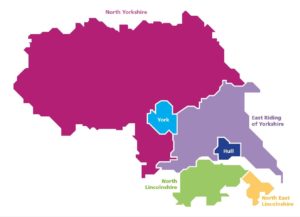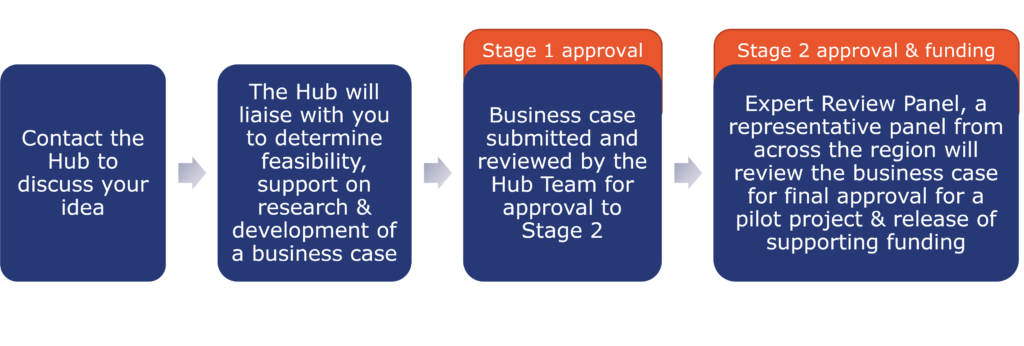Digital Primary Care Innovation Hub
Enabling transformation through innovation
About the Hub
A pioneering partnership between the Humber and North Yorkshire Health and Care Partnership and Health Innovation Yorkshire & Humber which aims to identify unmet clinical and non-clinical needs in primary care.
The Innovation Hub will be the “front door” for digital enabled innovation and improvement for primary care within the Humber and North Yorkshire region across the six places, East Riding, Hull, North Lincolnshire, North East Lincolnshire, North Yorkshire and York.

- Single Point of Contact: We are the single point of contact for all system wide innovation enquiries and requests for guidance, advice and support and we will lead on the liaison between key stakeholders across the region to help develop partnerships that might yield new ideas for projects to address unmet needs.
- Capturing unmet needs: We are developing a unified approach to capturing, validating and prioritising the unmet needs of the Humber and North Yorkshire system. Unmet needs can be both clinical and non-clinical. The Innovation Hub can support with the identification and validation of market ready innovations to help drive improved health outcomes, clinical processes and patient experience within primary care across the Humber and North Yorkshire health economy.
- Signposting: Signposting and connecting organisations both within the system (NHS providers/ Commissioners/Other Integrated Care System Members) and external to the system (including industry and academia). By creating a managed and prioritised repository of unmet needs, that can be solved through innovation, the Innovation Hub will ensure the Integrated Care System is at the cutting edge of identifying, evaluating and embedding innovative and transformational approaches. Working closely with our partners, such as the Yorkshire & Humber Academic Health and Science Network, academia, industry, research funders and providers of health and care, we are working together to help accelerate the development and adoption of innovative solutions to help address these unmet needs.
The Academy of Medical Sciences (Publication: Unmet need in healthcare; Summary of a roundtable 31 July 2017; 430378 (acmedsci.ac.uk) defined this as;
“Unmet need for healthcare can be seen as covering a spectrum of healthcare needs that are not optimally met. At one end there is unexpressed demand” (people who have healthcare needs but who are not aware of them, or who choose not to seek healthcare). At the other end there is “expressed demand that is sub-optimally met”. This can include people ineligible for treatment, or who have poorer quality treatment than would optimally be the case. For some individuals, their unmet need may be a combination of the two.”
- What will happen when you contact us with an idea:

- Use digital to improve the way services are designed, delivered and managed in an integrated way, with a clear focus on the individual and their experience, and where health and care professionals can make the best decisions because they have the information they need, at the point of care when they need it.
- Optimise the value of data to create intelligence to be used routinely to improve patient safety, deliver better health outcomes and tackle inequalities.
- Nurture a thriving digital health and care ecosystem, supporting research and innovation, developing skills and capabilities and recognised internationally as an exemplar of innovation and digitisation.
- Health Innovation Yorkshire & Humber is one of 15 Health Innovation Networks set up by NHS England to operate as the key innovation arm of the NHS, previously known as Academic Health Science Networks, AHSNs.
- Across the country Health Innovation Networks act as a bridge between health care providers, commissioners, academia and industry. By connecting these sectors, we help to build a pipeline of solutions for the NHS from research and product development through to implementation and commercialisation.
- Locally we work in partnership with our regional health and care community and develop projects, programmes and initiatives that reflect the diversity and meet the needs of our local populations and health care challenges.
